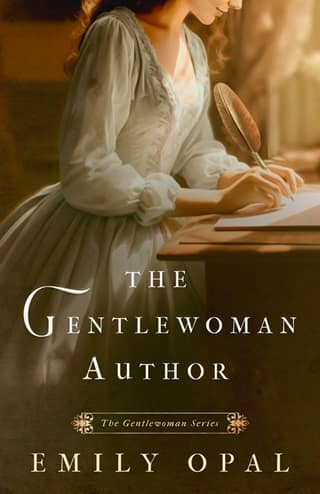Chapter 12
Chapter Twelve
I n the solitude of the window seat, heavy curtains obscuring her from intruders, Louisa turned the pages of A Woman Who Loves . She read it for the fourth time, imagining her aunt as the author. It made her laugh, the impossibility of it. This book was everything and, in each perusal, showed new treasures of insight. Penelope did not wait for her father to marry her off or her aunt to find her a suitable husband. She was a heroine in the true sense of the word—a woman who sacrificed to gain her reward. A brave woman.
Like Penelope, Louisa knew what she wanted, and it wasn’t Mr. Fletcher or whomever her father chose for her. She wanted John Lawrence, but he’d not made the declaration she expected. No word of outrage against her father. No admission of love. No intention to make her his own. He’d been uncomfortable and would not look into her eyes, which was a pity because the deep sorrow that shone from her face would certainly have elicited an immediate proposal. Already more than five weeks of her time in Bath were gone with no sign of John, and no other man she met in Bath compared to him.
Louisa simply knew he loved her. Besides, he had kissed her under the chestnut tree two years ago, never mind that he’d been shy ever since, refusing even to hold her hand. When she came of age, she expected a proposal, but he avoided her. He said he hadn’t the money to set up house. As if she cared for such things. She craved the independence of running her own home, and its grandeur held no import.
The conversation at the literary society reinforced her feeling of entrapment. Very few saw it her way, that romance, love, was the greatest and most worthy objective. One deserving of sacrifice. It did not matter if the world disagreed, only if John Lawrence did.
They’d grown up together. He existed in almost every one of Louisa’s memories, was a friend, and had comforted her during every trial. Except this final, most important one.
What would Penelope, the woman who loves, do?
The question plagued. In the story, when Penelope proposed elopement, her lover was only too happy to lose the respect of his family and his parents in exchange for the happiness of marriage to his darling. If only Louisa had read the book before she’d left for Bath. Now, she was trapped and miles and miles away from John with barely a choice as to what she did each day.
Mary exhibited her at balls, which did not amuse, because John was not there to dance with her. She visited various acquaintances whom her aunt and Mrs. Eliot thought might help her find a husband or move up in society. She attended dinners, soirées, musicales, and routs. She danced, played cards, and was infernally bored. She wanted John. Shopping remained the single consolation in a life of drudgery. Even then, there was no John to see how fetching she appeared in creamy blue silks that matched her eyes to perfection and heightened the sheen of her pale curls.
If he could but see her, he would fall to his knees at once and beg for her hand. Confined to Bath, trapped in an endless parade of social obligations, a wave of helplessness left her lethargic. Her hands wilted and she let the book fall to her chest, limp arms splaying to her side. She had not even the comfort of explaining herself to Aunt Mary, who would not understand, and her father would only nod, pretending to heed while not listening at all. If only her mother were with her.
“Louisa?” Mary entered the room. Louisa did not wish to be discovered, so she stilled, waiting for Mary to give up and look elsewhere. Luck was not on her side, and Mary pulled back the curtain. “There you are.”
“Pardon me. I was so enraptured by the story I did not hear you come in.” The book lay upside down, but with so little privacy afforded her, Louisa forgave herself the obvious lie.
“This again?” Mary’s brow puckered at the novel.
“It inspires me.”
Mary’s frown deepened. “We are due at the Picketts’ in an hour. Mr. Fletcher will be there. Wear your blue silk. It is most becoming.”
Louisa did not wish to go. An afternoon to herself would do her good. She groaned and looked out the window. “Must I go? I am exhausted.” It was true. She felt unable to move her limbs. “I want to stay.” Her voice pitched in the child-like whine that irritated her father. Intent on getting her way, she swallowed and tried again. “I must rest from our constant activity.” Aunt’s mouth was in a straight line. Louisa must try harder not to sulk. Aunt Mary did not like a sullen face, though she rarely said so. She straightened herself and added, “Please?” in her most polite tone and with her most pathetic eyes.
It worked. Aunt Mary’s face softened, and she sat next to Louisa. “Of course, you are tired. Poor dear.” She smoothed a strand of hair from Louisa’s forehead and clucked over her for a few moments. Louisa basked in the attention. She knew they were both thinking of her motherless state. “I will go with Agnes and be gone only an hour, two at the most.”
An hour or two. What could she do with a few minutes alone? It was a gift. Louisa leaned against her aunt, a little contrite for being disagreeable. Aunt did her best. “Thank you,” Louisa said.
Aunt Mary left the room, and Louisa returned to her problem. Time to act, as Penelope might, but how? Louisa re-imagined her final conversation with John, seeking inspiration. This time, she asked him to run away with her. In this new scenario, his eyes met hers in ecstasy. He told her eloping was what he dreamt of. He thanked her repeatedly for her acquiescence. How romantic their escape! Louisa sighed and melted into Mrs. Eliot’s plush cushions.
As soon as the front door closed behind Aunt Mary and Mrs. Eliot, Louisa went in search of pen and ink. The inkwell in the morning room was dry. And little wonder. Aunt Mary asked Mrs. Eliot for more only yesterday. A frequent request. One would expect Aunt Mary to keep enough ink on hand for her correspondence. Louisa mounted the stairs and went into her aunt’s room. There, near the window, was a dressing table turned writing desk. Even from the door, Louisa noted the row of empty ink bottles and numerous plumes as well as a stack of paper weighted down with a small sculpture of a woman reading.
With no intention of intruding on anyone’s privacy, Louisa approached the desk laden with papers. Under the mess there must be ink. She rifled through the chaos, so unlike Aunt Mary, until her eye caught on the words of what must be a letter. Overcome with curiosity, she picked up a page and read.
…received your letter only yesterday. I will depart immediately. Forgive me, my love. When I did not come at once, it was in protection of you, my dearest one. I did not wish to soil your name with my low birth. Now, I see that we are of one heart. Our separation pains you as well as it injures me. If you are in half the agony I endure, there is only one solution.
Aunt Mary had a lover! He wanted to run away with her? Stunned, she sank into the chair when an open sheet of paper to the side of the desk caught her attention. The paper was a deeper hue of cream, weighed down by a large wax seal. An irresistible temptation. It must be from Aunt’s sweetheart.
Dear Lady Mary,
Please respond and inform us on the progress of your next book. We earnestly hope there will be a second and many more afterward. Let us assure you of our desire to remain discreet as to your identity…
This made no sense. Why was her aunt receiving mail addressed to Lady Mary? She scanned down to the final sentence.
Enclosed are several clippings from London newspapers exclaiming the virtues of A Woman Who Loves…
She read every word several times until meaning emerged alongside Louisa’s sense of propriety. With shaking fingers, she refolded the letter and put it carefully where she’d found it, took a full bottle of ink that had been hidden under the letter, and left the room with a cold hand on her hot cheek. Shame warred with excitement. Louisa had discovered a great secret. Her aunt was Lady Mary, authoress.
When Mrs. Eliot and garish Miss Barry had hinted at the possibility, Louisa scoffed. But here was proof! To think, Aunt Mary led a second life. She, a woman ever preaching the importance of ladylike behavior, hid a shocking secret.
Was it shocking? Indecent? Louisa could hardly say, but knowing that her aunt had authored A Woman Who Loves transformed her world. Mary was the aunt in the story. The kindly relation who took the couple in, supported them, gave them hope, nurtured their love. If this were so, and it seemed it was, Mary would lend aid to Louisa in a similar way. Aunt Mary was a hero.
Just like her aunt, Louisa took her future into her own hands. In a letter, she confessed her love to John. When he rescued her from her dreary life, Aunt Mary would stand guard over them.
Dear John,
You love me and must hope that I love you in return. With all my being, I assure you, you do not love in vain.
At this point in the letter, Louisa recalled, though imperfectly, the words she’d read on Mary’s desk.
My pain is your pain, each of us suffering injury in our separation. Come to me, love. Only in you will my happiness be found.
She signed the letter and posted it without delay. She had only to wait. John would come, and Louisa’s life could begin in earnest with a swift return to her home in Cornwall, a wedding, and blissful life as Mrs. John Lawrence.
 Fullepub
Fullepub 



